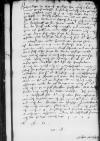Wil ich E(uer) G(naden) nicht bergen, das mir der her Stanisław Kostka (*1487 – †1555), as a leader of the so-called nobles' party active in Royal Prussia since 1536, Kostka stood in opposition to most of the members of the Council of Royal Prussia, who wanted to maintain the autonomy of the province and a "balance of power" in terms of governance. The tension between the Prussian Subtreasurer and the Council had been increasing since the Diet in Graudenz (Grudziądz) in 1533. Kostka, connected with the royal court since his youth, was sent to Graudenz as the King's deputy and, contrary to custom, decided to take part in the proceedings. In response to such a step, the Council members stopped the meeting. Kostka accused them of hostility towards the Poles and intervened on this matter at the court. In the absence of the then Bishop of Ermland (Mauritius Ferber) it was Dantiscus who chaired the Graudenz Diet. The incident badly harmed his future relationships with Kostka; 1531-1555 Treasurer of the Prussian lands and Treasurer of Marienburg (Malbork); 1544-1545 Castellan of Elbing (Elbląg), 1545-1546 Castellan of Kulm (Chełmno); 1546-1549 Vice-Voivode of Kulm; 1546-1551 Voivode of Pomerania; 1551-1555 Voivode of Kulm (PSB 14, p. 356; Urzędnicy 5/2, p. 216; MAŁŁEK 1976, p. 119-123)⌊KostkaStanisław Kostka (*1487 – †1555), as a leader of the so-called nobles' party active in Royal Prussia since 1536, Kostka stood in opposition to most of the members of the Council of Royal Prussia, who wanted to maintain the autonomy of the province and a "balance of power" in terms of governance. The tension between the Prussian Subtreasurer and the Council had been increasing since the Diet in Graudenz (Grudziądz) in 1533. Kostka, connected with the royal court since his youth, was sent to Graudenz as the King's deputy and, contrary to custom, decided to take part in the proceedings. In response to such a step, the Council members stopped the meeting. Kostka accused them of hostility towards the Poles and intervened on this matter at the court. In the absence of the then Bishop of Ermland (Mauritius Ferber) it was Dantiscus who chaired the Graudenz Diet. The incident badly harmed his future relationships with Kostka; 1531-1555 Treasurer of the Prussian lands and Treasurer of Marienburg (Malbork); 1544-1545 Castellan of Elbing (Elbląg), 1545-1546 Castellan of Kulm (Chełmno); 1546-1549 Vice-Voivode of Kulm; 1546-1551 Voivode of Pomerania; 1551-1555 Voivode of Kulm (PSB 14, p. 356; Urzędnicy 5/2, p. 216; MAŁŁEK 1976, p. 119-123)⌋ ein deutsch brifflein, wie wol wir Poln, zwgeschickt hatt, dorinne er begerth, das ich noch einen tagk zw Heilsberg (Lidzbark Warmiński, Heilsberga), town in Ermland (Warmia), the main seat of the bishops of Ermland⌊HeilspergkHeilsberg (Lidzbark Warmiński, Heilsberga), town in Ermland (Warmia), the main seat of the bishops of Ermland⌋
bei sein harren wolde. Dieweil mich dan der brieff aldo nicht
antroffen
vnd mir alhie heute erst zwkommen, mein befhe instruction auch mith
bringt, das er sich alher sampt den dienern, die er gestellen, sall vorfugen,
vnd ich auch furstliche durchlaucht koniglicher maiestet, meines
allergenedigsten hern willen zwvorbringen geneigt spure, ist derwegen an E(uer) G(nade) mein dinstliche bitt, E(uer) G(nade) woln im neben meinem brieff schreiben und vormhanen, das er sich alher sampt den dienern vorfugen wolde.
Wie wol ich besorge, er wirth alhir etliche tage vorczihen mussen, idoch wirth sein
czeitliche ankunfft furstlicher durchlaucht ursache geben, das kegen theil
deste eher zwerfordernn, domith dem vnkost auch ein mol abgeholffen werde
etc.
Noch der gnedigen annhemung, so mir heute von furstlicher durchlaucht
widerfaren, hatt furstliche durchlaucht kurczlich mith mir beschlossenn, ich
solde E(uer) G(naden) schreiben vnd bitten, das die selbe irenn boten an
konigliche
maiestet vor dinstage ader mithwoch nicht abfertigen wolde, den vff der tage
einen wirth furstliche durchlaucht auch ich Eur Gnaden an hoff schrifften
zwschicken.
Bitt derhalben, E(uer) G(nade) wolden den botten vorczihen. Ich hab an E(uer) G(nade) botschafft fu(rstliche)r d(urchlauch)t mith allem fleis angeczeigt, wil
auch dasselbe, wan ich zw meiner genedigsten fraun kome vnd mith dem
herczogen von Holsthein zurede werde, nicht mith wenigerm fleis thun. Domith hab ich
mich E(uer) G(naden) dinstlich und dieselbe Gotte dem Almechtigenn befholenn.


 BCz, 1597, p. 830
BCz, 1597, p. 830